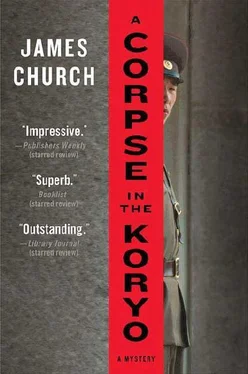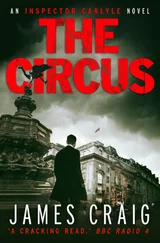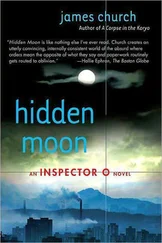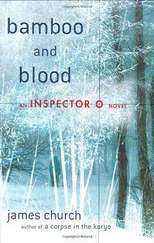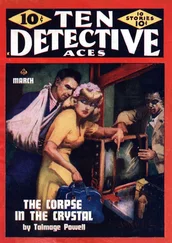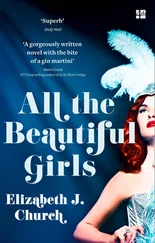James Church - A Corpse in the Koryo
Здесь есть возможность читать онлайн «James Church - A Corpse in the Koryo» весь текст электронной книги совершенно бесплатно (целиком полную версию без сокращений). В некоторых случаях можно слушать аудио, скачать через торрент в формате fb2 и присутствует краткое содержание. Жанр: Полицейский детектив, на английском языке. Описание произведения, (предисловие) а так же отзывы посетителей доступны на портале библиотеки ЛибКат.
- Название:A Corpse in the Koryo
- Автор:
- Жанр:
- Год:неизвестен
- ISBN:нет данных
- Рейтинг книги:3 / 5. Голосов: 1
-
Избранное:Добавить в избранное
- Отзывы:
-
Ваша оценка:
- 60
- 1
- 2
- 3
- 4
- 5
A Corpse in the Koryo: краткое содержание, описание и аннотация
Предлагаем к чтению аннотацию, описание, краткое содержание или предисловие (зависит от того, что написал сам автор книги «A Corpse in the Koryo»). Если вы не нашли необходимую информацию о книге — напишите в комментариях, мы постараемся отыскать её.
A Corpse in the Koryo — читать онлайн бесплатно полную книгу (весь текст) целиком
Ниже представлен текст книги, разбитый по страницам. Система сохранения места последней прочитанной страницы, позволяет с удобством читать онлайн бесплатно книгу «A Corpse in the Koryo», без необходимости каждый раз заново искать на чём Вы остановились. Поставьте закладку, и сможете в любой момент перейти на страницу, на которой закончили чтение.
Интервал:
Закладка:
"Bleeding circles?"
"To solve a case you have to put the wind in ajar. For me, life consists of badly limited possibilities, but I know the parts are endlessly rearranged, always shifting, always changing. Nobody puts down their foot twice in the same place. I once heard a Westerner say, 'What you see is what you get.'
We laughed for days about that at the office. Nothing is like that. Nobody is like that. But it's what you people want to believe. Straightforward, direct, what's the term?"
"Transparent."
"Ah, Richie, you are trying to read my mind. You shouldn't do that.
No, not transparent. It doesn't matter. I'm not saying your way is wrong.
It doesn't exist, not for me."
"So nothing is ever solved. That is a grand excuse if ever I heard one."
"An excuse? Could you live with uncertainty, moving shapes and shadows, morning, noon, and night, my friend? The mountains have become the only certain thing in my life. When they disappear, I die."
"Glorious words, Inspector. Put them to music and they'd make a fine, sad drinking song. But we're not here to sing, are we? You're to talk, I'm to listen." He wrote something in his notebook and then turned on the tape recorder but quickly turned it off again. "The tragedy, Inspector, is that you have poetry in your soul, but all my ears are trained to hear is facts."
"Don't worry about it, Richie. There's less poetry as you go along."
5
That night, I couldn't sleep. I was reading when Song stepped into the room, pale and scared. There was blood on his shirt, lots of it. "Come, quickly, to the temple." I didn't ask but followed him silently up the steep road; he walked so fast, it was hard to keep up. The rain had stopped, but there were enough lingering clouds to cover the moon.
The road was dark, and the sound of the river, swollen with the afternoon's storm, echoed against the hills. At the gate to the temple compound, Song was waiting for me. "In there." He pointed. "The low building." He was hoarse, like someone who had been screaming. "I'm staying here." He looked down at his shirt. "You couldn't pay me enough to go back in there."
Before dawn I was on my way north to Kanggye, driving fast. That early, I didn't expect any other traffic. I stuck to the middle of the highway, because if I hit a pothole at the speed I was going, the car's frame would probably break apart. When the gas gauge showed empty, I pulled over.
The gas can in the trunk was only half full; it might get me to Kanggye but no farther. Song owed me, for the gas, for everything. He knew he owed me, and he knew that someday I was going to collect.
6
The Inn of the Red Dragon in Kanggye was a wreck. The TV lay on its side, smashed. I stepped on the pages of a paperback book scattered over the floor. A moan came from the back room. The clerk was lying on a bed, his face to the wall. He rolled over when he heard me at the door. He had been pistol-whipped, badly.
"Welcome back, Inspector. I don't have any vacancies." It was hard to understand him because his face was so bruised.
"Who?"
He coughed and his body tensed in pain. Maybe a rib was broken, too. "What difference does it make? I don't keep score anymore. They asked about you."
'And?"
"I told them I didn't have any registration papers for anyone of your description."
"They believe you?"
"That's when they broke my ribs. What do you think?"
I turned to go. "I'll be back. I've got to get to Manpo."
He shook his head. "Too late. You'll never make it."
"I need some gas."
He wiped the blood that was oozing from his mouth. "Grandma Pak might have some gas coupons." He moaned again and rolled back to face the wall. "If she's still alive."
The place where Grandma Pak usually sat was empty. The blanket was still on the floor, along with her eyeglasses. The frames were bent and one lens was shattered. At least it wasn't a bullet hole. I looked along the bottom of the wall for a loose board, anything that might be a place to hide papers. In the corner was a different, older party newspaper. April 15, 1962. The editorial on the front chattered about loyalty in bold letters.
Underneath the newspaper was a small wooden box. Loyalty covers a lot of sins, they like to say. Maybe that was what she figured.
The box felt worn and smooth, the corners rounded from being handled.
It had been made without nails, from Siberian chestnut. It was notched along the top to make the lid fit perfectly; the grain on each side matched precisely all the way around. I didn't have to look twice to know whose hand it was from. My grandfather worked four months, morning and night, on that box. Most of the detail work was on the inside: a carving of a tiger on a rock, with a pine forest stretched below. You could even see the pinecones. I opened it up. There were some old train schedules and a black-and-white photograph of a young woman, her mouth set, staring into the camera with wide, dark eyes. Underneath were three gas coupons, the fancy ones with scenes of workers embossed on the front and farmers in a rice paddy on the back. They had expired twenty years ago. I put two in my pocket, then put the box in the corner again, under the newspaper. Maybe Grandma Pak would find her way back. I wanted the box there if she did.
7
The gas station at the edge of the city looked deserted; the front gate was shut tight. A sentry waved me away when I pulled up. An old man wearing a cloth cap looked at me from behind the bars of the gate.
"Everything's closed. You can't get nothing here." I handed the coupons to him. He studied them closely, then said something to the sentry. The gate sagged so badly it took the two of them to swing it open.
The old man put out his hand. "Give me the keys. You can't drive in without a military pass. You can sit over there if you want." He indicated a concrete bench on a patch of dirt next to a low fence. He got in and started the car. "A Volvo. Not many of these left. None in Hamhung as far as I know. And only a few in Pyongyang." I watched the car pull up to the fuel pump at the far end of the compound. The sentry dragged the gate shut and locked it.
A rose bush grew along the fence behind the bench, climbing up from the ugly oil-stained pavement to make a thick wall. The flowers were red, a shade lighter than the girl's blouse had been. The bush was pruned and tended, fed and watered. Each leaf was a glossy green, free of pests or disease. At night, when the air was still and no trucks were spewing exhaust along the street, this spot must have been a perfumed silence.
The old man was standing next to me. "Even in this sadness, in this ugly time, the roses want to bloom," he said quietly. "Here are your keys. You better keep these gas coupons. Or maybe put 'em back where they came from." He touched the bill of his cap in a small salute and watched from the side of the road as I drove down the town's main street, past a half-ruined guesthouse called the Rainbow Inn and a park where a woman and a frail girl were sweeping imaginary leaves from the gravel walkway.
At the edge of town, the street made a sharp bend and gave way to a two-lane, rutted dirt track. I couldn't drive fast, but with a full tank of gas, I made it to just outside Manpo with only one stop. A bridge was down, and two soldiers were directing traffic through a field to a ford across the river. They weren't checking papers, but when I parked at the water's edge, waiting my turn, one of them looked at my plates, then stuck his head in the window. "You really from Hamhung?"
"Nah. Never been there." From his accent I could tell he wasn't from that part of the country. "Hamgyong people are kind of thick. I won this car in a card game with a couple of them." He laughed and waved me on, forgetting that he meant to bum a cigarette.
Читать дальшеИнтервал:
Закладка:
Похожие книги на «A Corpse in the Koryo»
Представляем Вашему вниманию похожие книги на «A Corpse in the Koryo» списком для выбора. Мы отобрали схожую по названию и смыслу литературу в надежде предоставить читателям больше вариантов отыскать новые, интересные, ещё непрочитанные произведения.
Обсуждение, отзывы о книге «A Corpse in the Koryo» и просто собственные мнения читателей. Оставьте ваши комментарии, напишите, что Вы думаете о произведении, его смысле или главных героях. Укажите что конкретно понравилось, а что нет, и почему Вы так считаете.
